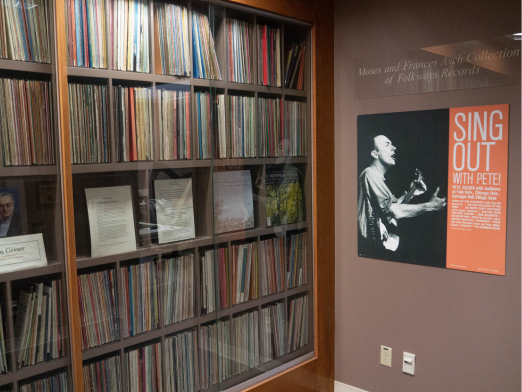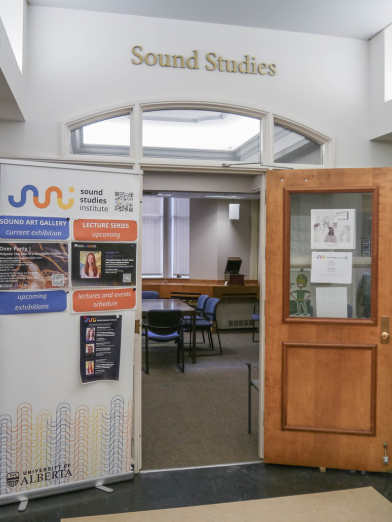‘Anything that is sound’
Carmen Rojas - 25 March 2024
In the basement of the Old Arts building, the ambient sounds that echo through the hallway quickly fade to an almost eerie stillness when you enter the Sound Studies Institute’s (SSI) brand new Sound3 Lab.
A state-of-the-art recording studio — the first of its kind at the U of A — the lab was made possible by funding from the Canada Foundation for Innovation received by SSI director Scott Smallwood, along with Michael Frishkopt and Julia Byl of the Canadian Centre for Ethnomusicology (CCE). (see sidebar)
The space was carefully designed in consultation with provincial acoustician Ellen Buchan and consists of two recording booths and a digital console with a touch screen mixing board.
Smallwood, Frishkopf and Byl will use the lab to support their personal research projects in areas such as audio gaming, music/sound therapy and community archives. But it will also be made available for other researchers and projects whenever possible.
An interdisciplinary network of sound researchers
The Sound3 Lab is an exciting addition to the array of activities SSI has been focused on since its founding in 2018.
The overarching goal of these activities is to bring together researchers from across campus in the service of “research and creative activities that centralize sound in any way.”
While it’s based in the Faculty of Arts with strong connections to the Department of Music (particularly the CCE), the institute’s intent has always been to build a broad, interdisciplinary network of researchers.
“We’re still doing a lot of work on artistic explorations, but in addition to that there’s the opening up to other disciplines who are working with sound,” says Smallwood, who is a professor of music composition and technology in addition to being director of SSI for the past four years.
Smallwood and Tom Merklinger, SSI’s programming and technical coordinator, are a small but highly-productive team.
They support researchers in a variety of ways — from collaborating on projects, to offering training and workshops, to providing technical services (Merklinger serves as the sound engineer for projects such as the Black Talk podcast, for example). They also schedule year-round programming that includes exhibitions, a lecture series and the annual Women of Folkways concert.

From archives to virtual realities
The hub for this support is located on the second floor of Old Arts, anchored by the beautiful Moses and Frances Asch Collection of Folkway Records – donated to the U of A in 1985 and leading to the creation of the folkwaysAlive initiative, which later evolved into SSI.
The consistent theme throughout the space is one of “old meets new.” A meeting space equipped with one of the only surround sound systems on campus, for example, is accessorized with a wax cylinder phonograph.
On the east side of the office is one of SSI’s newest spaces, opened just over a year ago under the guidance of interim director Marilène Oliver — a gallery containing eight audio channels for hosting sound installations.
On the opposite side of the building is a media lab that is used in part as a studio for digitizing phonograph, reel-to-reel tape, floppy disc and other media. This is where archival work on projects such as the Regula Qureshi collection takes place.
Qureshi — a professor emeritus from the Department of Music who was a founding force behind both the Centre for Ethnomusicology and folkwaysAlive — has entrusted SSI with the task of digitizing years’ worth of field recordings from poetry gatherings that took place in her homes in both Edmonton and Pakistan.
“This is a really important project,” says Smallwood. “It’s an archive of an extremely important person in the music department but also in the larger Indian and Pakistani diaspora communities in Edmonton.”

The media lab is also where SSI stores the field recording gear they train researchers to use. Often this is done through workshops, such as one they custom designed for sociologist Sara Dorow’s SSHRC-funded “Work-Life in Canada” project.
In collaboration with German photographer Martin Weinhold, Dorow is exploring working life in Canada by capturing the sounds and images of worksites across the country. With guidance from SSI, Dorow and her research team are able to make their own recordings in the field.
SSI has also run workshops on topics such as audio editing, in-studio recording and podcasting.
Next door to the media lab is “Studio B,” an editing suite equipped with the latest technology for video, audio, VR and game development. These are the tools that have helped bring projects such as artist and professor Marilène Oliver’s virtual reality installations “My Data Body” and “Your Data Body” to life.
Part of the larger Know Thyself as a Virtual Reality research project, these multimedia installations create an immersive experience that invites viewers to engage with personal medical data. Smallwood is a team member on these projects, producing music and soundscapes that are used in the virtual reality environments.
A conceptual guiding force
As SSI embraces the potential for cutting-edge technology to advance sound research, they also continue to honour the history that brought them here.
Under the leadership of inaugural director and musicologist Mary Ingraham, followed by linguistics professor Ben Tucker and now Smallwood, SSI has kept the spirit of folkwaysAlive at its core.
“The Folkways Collection is a conceptual guiding force,” says Merklinger. “On the wall by the collection [there's a quote from] Moses Asch that says ‘anything that is sound.’ That’s always been the basis of our work.”
CFI announces funding stream for the social sciences, humanities and the arts
The mandate of the Canada Foundation for Innovation (CFI) – Canada’s fourth federal funding agency – is to invest in research infrastructure that enables high-quality research. As researchers across the College of Social Sciences and Humanities know firsthand, vast amounts of data are changing the way research is carried out – requiring new collaborations, research methods and computational tools.
Earlier this year, CFI announced that it will establish a social sciences, humanities and arts-specific funding stream with adapted assessment criteria in order to help researchers meet these changing needs. More information can be found in the February 2024 issue of the CFI Update newsletter.